摂薬の教育
Education
6年間の学び
摂南大学薬学部は、病院や在宅治療などの臨床現場で薬物治療のリーダーとして活躍できる薬剤師や創薬・育薬の分野でも力を発揮できる薬剤師を養成するために薬学教育、研究プログラム、環境整備などの充実を図ってきました。
今、薬剤師の役割は、臨床、研究それぞれの分野で広く深くなり「人に向き合い、連携する能力」が強く求められています。
薬学部では、そんな資質を養うために、多くの体験・挑戦の場を用意。
将来の可能性を広げる専門知識と医療人マインドを養います。
POINT 01 チーム基盤型学習
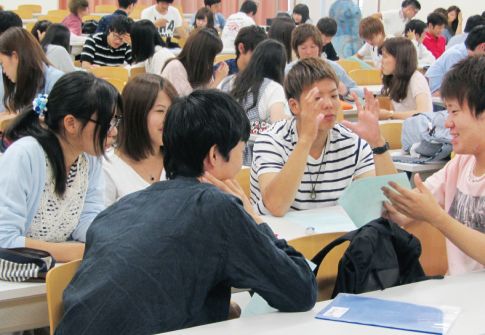
薬学部が取り入れているチーム基盤型学習(TBL)とは、4〜6人の学生からなるチームが力を合わせて、一人では解くことのできない課題に取り組んでゆく授業です。
他のチームと競い合ったり、お互いに教え合ったりする中で、参加するすべての学生が成長します。
また、医療チームの中で活躍するための人間力も高めます。
「教室では気軽に質問ができない」、「知識を使わないから身につかない」といった、従来の「一方通行」とも言える講義が抱えていた問題点を解決する学習方法です。
The Faculty of Pharmaceutical Sciences has adopted team-based learning (TBL), which is a class in which teams of four to six students work together to tackle problems that cannot be solved alone.
As we compete with other teams and teach each other, every student who participates grows.
It also enhances the human ability to play an active role in the medical team.
It is a learning method that solves the problems of conventional "one-way" lectures, such as "I can't ask questions casually in the classroom" and "I can't learn because I don't use my knowledge."
POINT 02 少人数能力別クラス
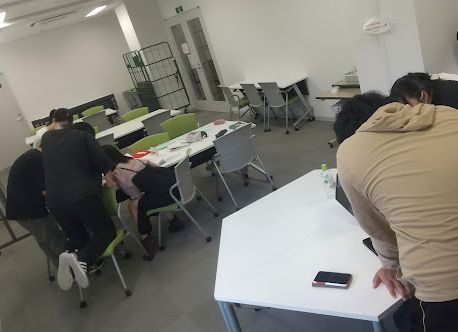
高校に比べ、大学の授業はボリュームが多く、スピードも速いです。入学後の授業についていけるのか不安な方も多いと思います。
薬学部では、1・2年次に開講されるほとんどの専門科目に少人数制の能力別クラスを設けており、若手の教員や上級生が皆さんに語りかけて苦手な科目の学習を個別に指導します。
知識の詰め込みではなく、興味や関心を引き出すことで能動的な学習スタイルを定着させます。
「ナゼ?」に気付くと「なるほど」が探したくなります。
能力別クラスでは対話を重視し、学生それぞれにあった勉強の処方せんを用意して学習をサポートします。
Compared to high school, university classes are more voluminous and fast. I think there are many people who are worried about whether they will be able to keep up with the classes after enrollment.
The Faculty of Pharmaceutical Sciences offers small-group ability-based classes in most of the specialized courses offered in the first and second years, where young faculty members and senior students talk to you and provide individual guidance on the subjects you are not good at.
Rather than cramming knowledge, we establish an active learning style by drawing out interest and interest.
When you notice "why?", you want to look for "I see".
Ability-based classes emphasize dialogue and support learning by preparing study prescriptions tailored to each student.
POINT 03 地域連携
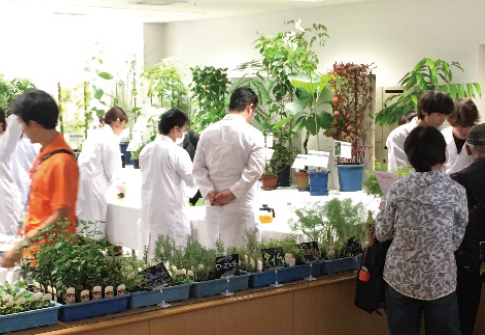
地域の医療団体が主催するイベントや、自治体の文化祭などに参加し、薬用植物の標本展示や健康茶の試飲を行っています。
また、薬用植物園/Botanical Gardenでは、春と秋に一般公開見学会を開催し、薬用植物に関する情報を提供しています。
子ども達を対象に、薬用植物園で栽培した植物のドライフラワーを用いたアクセサリー作成体験なども行っています。
We participate in events organized by local medical organizations and cultural festivals of local governments, and exhibit specimens of medicinal plants and taste health teas.
The Medicinal Botanical Garden also organizes public tours in spring and autumn to provide information about medicinal plants.
For children, we also offer experiences such as making accessories using dried flowers of plants grown in the Medicinal Botanical Garden.
POINT 04 防災教育
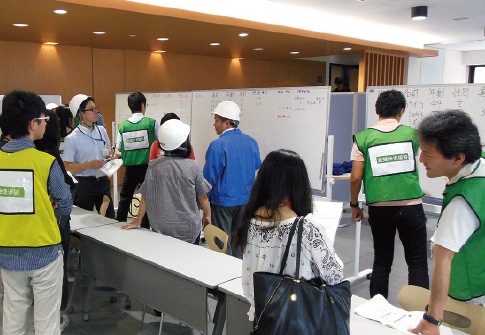
大規模災害発生時を想定した防災訓練を実施しています。法定訓練や各訓練参加者に役割を与えた避難所運営訓練を行いました。
さらに看護学部と連携し、被災対象者の健康状態の観察、判断、対応・処置、報告を行う救出救護活動訓練も取り入れました。
訓練を通じて、問題点を抽出し、災害への対応力を身につけることを目指します。
We conduct disaster prevention drills in the event of a large-scale disaster. We conducted statutory training and evacuation center management drills in which each training participant was given a role.
In addition, in cooperation with the Faculty of Nursing, we also incorporated rescue and relief activity training to observe, judge, respond, take action, and report on the health status of disaster victims.
Through training, problems are identified. We aim to acquire the ability to respond to disasters.
POINT 05 薬学臨床実習
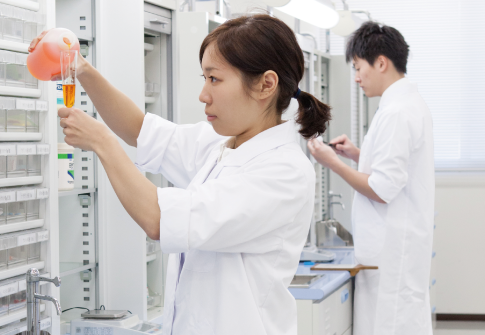
薬学の6年制教育は、臨床での高い実践的能力を身につけた薬剤師の育成が求められています。その能力を磨く場となっているのが、4年次2月からの薬学臨床実習です。
病院と薬局でそれぞれ2ヶ月半にわたって実施される薬学臨床実習では、さまざまな業務を通して薬に関する知識を深めると同時に、各種技能を身につけます。
また、医師や看護師などと実際に仕事を行うことで、チーム医療の一員としての責任感や患者さんと接する態度を学んでいきます。
The six-year education in pharmacy requires the development of pharmacists who have acquired a high level of practical skills in clinical practice. The place to hone this ability is the clinical training in pharmacy from February of the fourth year.
In the clinical pharmacy training conducted at hospitals and pharmacies for two and a half months each, students deepen their knowledge of drugs through various tasks and acquire various skills.
In addition, by actually working with doctors and nurses, students will learn a sense of responsibility as a member of a team medical care team and an attitude toward dealing with patients.
実務実習
5ヶ月間の実習の流れ
6年制薬学部で薬剤師になるには、4年次までに身に付けた薬学の知識を臨床に応用できるように、事前学習として1ヶ月以上学習します。
その後、薬学共用試験(CBTおよびOSCE)に合格して病院と薬局でそれぞれ2ヶ月半の実習を行い、実際の患者さんに対する薬剤師の関わりを学ぶことが必須条件となります。
In order to become a pharmacist in the six-year School of Pharmacy, students must study for at least one month as a preliminary study so that they can apply the knowledge of pharmacy acquired up to the fourth year to clinical practice.
After that, it is essential to pass the Common Pharmacy Examination (CBT and OSCE) and undergo two and a half months of practical training at a hospital and pharmacy to learn about the relationship of pharmacists with actual patients.
実習内容例
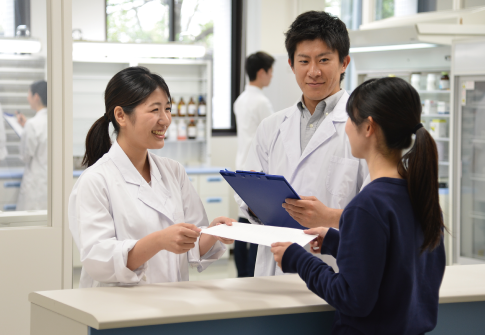
病院実習(病棟での実習)では、病棟を担当する薬剤師の指導のもと、医師とのカンファレンスなどに参加することで代表的な疾患(がん、高血圧症、糖尿病、心疾患、脳血管障害、精神神経疾患、免疫・アレルギー疾患、感染症)に対して、安全で有効な薬物療法の提案と評価できる能力を修得します。
薬局実習(在宅医療現場での実習)では、普段生活する居宅で療養が必要になった患者さんに対して、適切な薬物療法の提供に貢献するため、実際に患家に行き、患者さんの話しを丁寧に聞きます。
そうすることで薬に関する問題に対して、薬の管理や服薬の支援を行い、薬剤保管及び残薬の確認などの指導を行います。
In hospital practical training (practical training in the ward), students participate in conferences with doctors under the guidance of the pharmacist in charge of the ward, and acquire the ability to propose and evaluate safe and effective drug therapies for typical diseases (cancer, hypertension, diabetes, heart disease, cerebrovascular disease, neuropsychiatric disease, immunological and allergic diseases, and infectious diseases).
In pharmacy training (practical training at home medical care sites), in order to contribute to the provision of appropriate drug therapy to patients who need medical treatment at their usual homes, we actually go to the patient's home and listen carefully to what the patient has to say.
By doing so, we provide support for drug management and medication administration for problems related to medicine, and provide guidance such as drug storage and checking for remaining medicines.
実習受入先
■ 国家公務員共済組合連合会 枚方公済病院
■ 独立行政法人地域医療機能推進機構 星ケ丘医療センター
■ 関西医科大学附属病院
■ 国立病院機構グループ
■ 枚方市薬剤師会所属薬局
摂南大学独自の取り組み
IPE教育
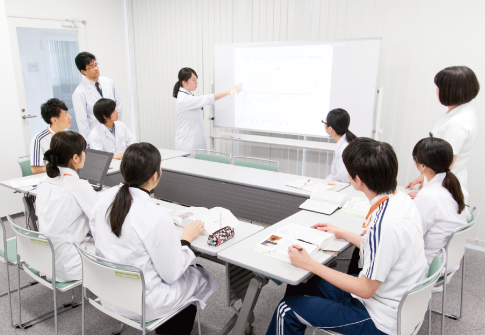
薬学部では、1年次から看護学部/Faculty of Nursingとの専門職連携教育(IPE:Interprofessional Education)を実施しています。
医療の現場では、薬剤師以外の職種(医師、看護師等)との協働(チーム医療)が重要です。このチーム医療を1年次から体験し、相互理解から始まり、臨床現場でのお互いの役割や連携の大切さ、連携の具体的な提案まで学ぶことができます。
例えば、4年次では患者さんの診療録(カルテ)から患者さんの状態や治療上の問題点を共有し、ディスカッションによって解決策等を導き出す能力を培います。
看護学部の学生と合同で、実際のカルテを用いて薬物治療や患者ケアについて考えることで、他の専門職の人が治療についてどのような立場、意見を持つのか実践的に理解しチーム医療への理解を深めることができます。
主な課題例:緩和ケアや在宅・地域医療に関する合同討議/患者の安全と質の高い医療の提供に関する合同授業/患者・生活者とのコミュニケーションに関する合同授業/臨床現場での薬学部・看護学部合同実習
The Faculty of Pharmaceutical Sciences conducts interprofessional education (IPE) with the Faculty of Nursing from the first year.
In the medical field, it is important to collaborate with professionals other than pharmacists (doctors, nurses, etc.) (team medicine). Students can experience this team medical care from the first year, starting with mutual understanding, and learning about each other's roles in clinical settings, the importance of collaboration, and specific proposals for collaboration.
For example, in the fourth year, students develop the ability to share patients' conditions and treatment problems from their medical records and derive solutions through discussion.
By thinking about drug treatment and patient care using actual medical records together with nursing students, you can gain a practical understanding of the positions and opinions of other professionals regarding treatment and deepen your understanding of team medicine.
Examples of main issues: Joint discussion on palliative care and home and community medical care / Joint class on patient safety and provision of high-quality medical care / Joint class on communication with patients and consumers / Joint practical training between the Faculty of Pharmacy and the Faculty of Nursing in a clinical setting.
キャリア教育
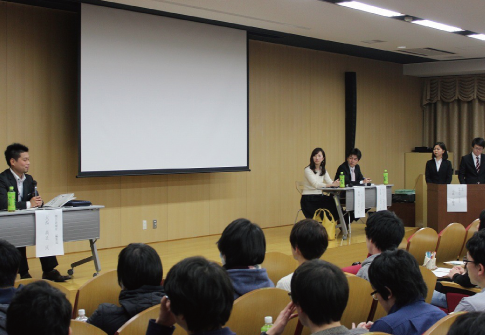
医療現場等で活躍する薬剤師の体験談を聞く座学、教育体験や学会参加などの自己研鑽・参加型学習を通して、薬剤師に求められる倫理観、使命感、職業観を身につけるとともに、問題解決能力を養成します。
薬剤師が活躍する場所は医療機関、研究所、メーカー、行政など多岐にわたります。薬剤師として求められる薬学以外の知識、技能(態度)を習得するために1年次のスタートアップゼミをはじめとする各種キャリア形成科目を設けています。
患者や各種専門職との関わり、グローバルコミュニケーションの視点からの外国語、薬事・衛生行政など幅広い学びで、将来の実践に備えます。
4年次後期においては、社会全体における薬学部出身者の位置付けを意識させる目的で、薬業界のみならず異業種(マスコミ、通信関係、スポーツ関係など)で活躍する各方面の方々にお越しいただき、学生とともにパネルディスカッションやグループディスカッションを行っています。
5・6年次においては、病院志望者、公務員志望者、製薬等企業志望者のグループを設け、それぞれのグループで各業界の動向、自己分析、採用試験対策など、きめ細やかな指導を行っています。
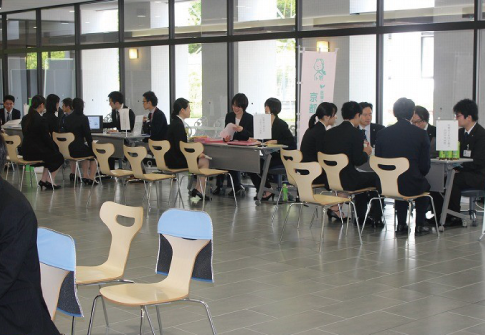
Through classroom lectures in which pharmacists who are active in the medical field, etc., and self-improvement and participatory learning such as educational experiences and participation in academic conferences are conducted, students acquire the ethics, sense of mission, and vocational perspective required of pharmacists, as well as develop problem-solving skills.
Pharmacists are active in a wide range of places, including medical institutions, research institutes, manufacturers, and governments. We offer a variety of career development courses, including first-year startup seminars, to acquire knowledge and skills (attitudes) other than pharmacy required of pharmacists.
Students will prepare for future practice by learning a wide range of subjects such as relationships with patients and various professionals, foreign languages from the perspective of global communication, and pharmaceutical affairs and public health administration.
In the second semester of the fourth year, with the aim of raising awareness of the position of graduates of the Faculty of Pharmaceutical Sciences in society as a whole, we invite people from various fields active not only in the pharmaceutical industry but also in other industries (mass communication, telecommunications, sports, etc.) to come and hold panel discussions and group discussions with students.
In the fifth and sixth years, we have established groups of hospital applicants, civil servants, and pharmaceutical and other company aspirants, and each group provides detailed guidance on trends in each industry, self-analysis, and preparation for employment exams.
資生堂ジャパン(株)との連携教育
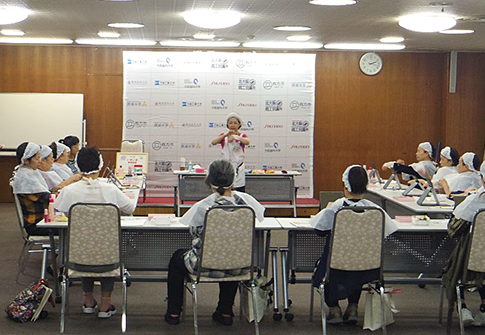
薬学部・看護学部では、資生堂ジャパン(株)との連携教育を展開しています。
化粧を施すことで、日常生活動作(気持ち、認知、身体運動、口腔機能)の向上を目指す『化粧療法』という手法があります。
これを用いて高齢者の認知症予防や日常生活動作の向上を図るだけでなく、地域の子育てママさんの生活の質向上を図ります。
薬学部では、化粧療法の実施方法をキャリア科目で学習し、資生堂ジャパン(株)とともに、枚方市の高齢者への化粧教室を展開しています。
この取り組みは、病気の予防、健康の維持を目的としており、他の大学にはない授業です。
The Faculty of Pharmacy and the Faculty of Nursing are developing collaborative education with Shiseido Japan Co., Ltd.
There is a method called "cosmetic therapy" that aims to improve daily living activities (feelings, cognition, physical exercise, oral function) by applying makeup.
We will use this technology not only to prevent dementia and improve activities of daily living among the elderly, but also to improve the quality of life of mothers raising children in the community.
At the Faculty of Pharmaceutical Sciences, students learn how to implement cosmetic therapy in career courses, and together with Shiseido Japan Co., Ltd., they are developing makeup classes for the elderly in Hirakata City.
This initiative is aimed at preventing illness and maintaining health, and is a class that is not found at other universities.
臨床アロマセラピー
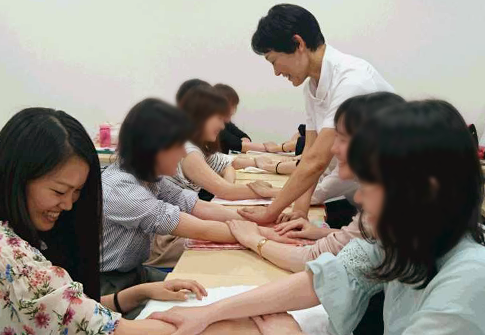
アロマセラピーの歴史や精油の抽出法や効果などを学ぶとともに、患者様が抱える苦痛を緩和するために実践されている補完代替療法のひとつである臨床アロマセラピーについて学びます。
そのうえで、緩和ケアや在宅医療およびセルフメディケーションにおいて薬剤師が果たす役割として、アロマセラピーの可能性を考えます。
身近なアロマの使用法として、スプレーや石鹸の作成や、アロマオイルを用いての簡単なマッサージを習得するなかで、コミュニケーション能力をも養います。
地域包括ケアにおける健康サポート薬局では、健康をより幅広く、積極的にサポートすることが求められており、本キャリア講座は、薬剤師の役割を考える実践的な講義となっています。
In addition to learning about the history of aromatherapy, the extraction method and effects of essential oils, you will learn about clinical aromatherapy, which is one of the complementary and alternative therapies practiced to alleviate the pain of patients.
In addition, we will consider the possibility of aromatherapy as a role that pharmacists play in palliative care, home medical care, and self-medication.
As familiar aroma usages, you will also develop communication skills while learning how to make sprays and soaps, and simple massages using aromatic oils.
Health support pharmacies in community-based comprehensive care are required to provide a wider and more active support for health, and this career course is a practical lecture to consider the role of pharmacists.
医歯薬連携
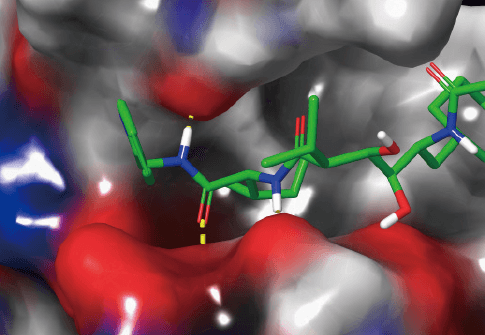
薬学部は、関西医科大学および大阪歯科大学とタッグを組み、新しい医薬品の開発研究を行っています。例えば、タンパク質の「インテグリン」は、がん、炎症性疾患やアレルギー疾患に関係しており、最近の研究ではiPS細胞の分化などにも関与していることが分かってきました。
我々は、このようなインテグリンとがんの関係に注目し、インテグリンのはたらきを制御する小さな分子を見つけ出しました。
「この小さな分子がどのような形でインテグリンに作用するのか?」これを医・歯・薬が連携して科学的に解き明かすことで、今までにないまったく新しいタイプの抗がん剤を創り出そうとしています。
薬学部で学ぶ基礎科目は、写真のように、小さな分子とタンパク質が互いに作用する理由や仕組みを解き明かすのに欠かせない学問です。
薬学部で、多くの気づきと発見に触れてください。
The Faculty of Pharmaceutical Sciences has teamed up with Kansai Medical University and Osaka Dental University to conduct research and development of new drugs. For example, the protein "integrin" is related to cancer, inflammatory diseases, and allergic diseases, and recent studies have shown that it is also involved in iPS cell differentiation.
We focused on the relationship between integrins and cancer, and found small molecules that control the function of integrins.
By scientifically elucidating how these small molecules act on integrins, we are trying to create a completely new type of anticancer drug that has never existed before.
The basic subjects studied at the Faculty of Pharmaceutical Sciences are indispensable for elucidating the reasons and mechanisms of how small molecules and proteins interact with each other, as shown in the photo.
At the School of Pharmacy, you will be exposed to many realizations and discoveries.
グローバル教育

薬学部海外研修では、薬剤師として活躍する場を日本に限らず世界へと広げられるように海外研修を実施しています。
低学年向けの海外研修ではアジア圏の国[例:ベトナム(2018年度)]の医療施設や伝統薬市場等を訪問し、新興国の医療現状の実情について学びます。
高学年はアメリカの大学の薬学部[例:ノースカロライナ大学(2019年度)]を訪問し、現地薬剤師と何例かの模擬症例に対する薬物治療について英語で討議します。
医療従事者が人々の生活の質(QOL)向上を目差すのは各国共通なものの、治療方針や治療薬選択には若干の相違が、また人々の生活様式や各国の健康保険には大きな相違があることを研修を通して学習します。
また、外国の薬学生や海外で活躍する本学卒業生等との交流会や海外大学の講師による講演会での質疑応答を通して国際的なコミュニケーション力を養います。
The Faculty of Pharmaceutical Sciences' Global Education conducts overseas training to expand the opportunities for pharmacists to be active not only in Japan but also around the world. In the overseas training for the lower grades, students visit medical facilities and traditional medicine markets in Asian countries [e.g., Vietnam (FY2018)] to learn about the current state of medical care in emerging countries.
Senior students visit the School of Pharmacy at an American university [e.g., University of North Carolina (2019)] and discuss drug treatment for several simulated cases in English with a local pharmacist.
Through the training, students learn that although healthcare professionals aim to improve people's quality of life (QOL) in each country, there are slight differences in treatment policies and drug selections, as well as significant differences in people's lifestyles and health insurance in each country.
In addition, students will cultivate international communication skills through exchange meetings with foreign pharmacy students and graduates of TUFS who are active overseas, and question-and-answer sessions at lectures by lecturers from overseas universities.
国家試験対策
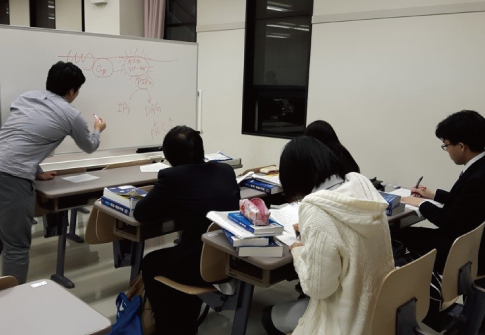
薬学部では、6年次生に対して薬学研究や総合薬学演習などの専門科目と並行して薬剤師国家試験に向けた独自プログラムを実施しています。
前期では、物理・化学・生物の基礎科目を重点的に復習します。
また後期では、外部講師等による国家試験対策講義を実施しています。
さらに学生は、本学教員作成のオリジナルテストや全国統一模擬試験を定期的に受験することにより、自身の学習到達度を確認しながら、学習を進めていきます。
このように薬学部では、学生全員が国家試験に合格するための全面的な教育支援を行っています。
The Faculty of Pharmaceutical Sciences offers sixth-year students a unique program for the National Pharmaceutical Examination in parallel with specialized subjects such as pharmaceutical research and seminars in general pharmacy.
In the first semester, students will focus on reviewing basic subjects in physics, chemistry, and biology.
In the second semester, lectures on preparation for national examinations are conducted by external lecturers.
In addition, students regularly take original tests prepared by our faculty members and nationwide mock exams to confirm their own learning achievements while proceeding with their studies.
In this way, the Faculty of Pharmacy provides full educational support for all students to pass the national examination.
摂薬の卒後教育
薬剤師生涯学習支援
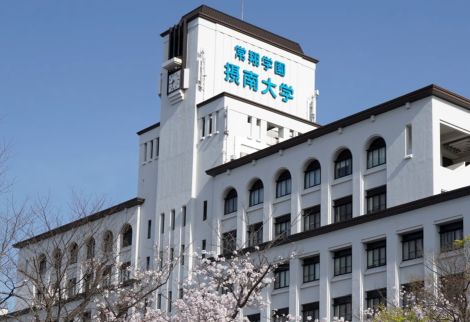
近年、薬剤師のレベルアップを図る目的で自己研鑽・生涯学習が注目されています。
本学ではこれらのニーズにこたえ、薬剤師資格取得後の学びをサポートしています。
第一線で活躍する研究者、実務者などを講師に招き、公開講座を定期的に開講しています。
たくさんの卒業生が日本薬剤師研修センター研修認定薬剤師としてその成果を認められています。
また、専門薬剤師や生涯学習の認定単位としても受講いただいています。
本年度も2つのシリーズ講座を開講し、皆さまのご参加をお待ちしています。
In recent years, self-improvement and lifelong learning have been attracting attention for the purpose of improving the level of pharmacists.
In response to these needs, the university supports learning after obtaining a pharmacist qualification.
We regularly hold open lectures by inviting leading researchers and practitioners who are active on the front lines as lecturers.
Many graduates have been recognized as Japan Pharmacist Training Center Training Center Training Certified Pharmacists.
They are also certified as professional pharmacists and lifelong learning credits.
We are holding two series of courses this year as well, and we look forward to your participation.
大学院進学への道
薬学研究科 医療薬学専攻【博士課程】

6年制学部を基礎とする本研究科では、幅広く医療関連分野で活躍できる人材を養成するため、臨床現場での実践的な活動のほか、当該専門領域にかかわる学術的知識や研究能力、薬学教育に指導者として貢献できる能力などを体系的に修得できる教育を展開しています。
高度な専門性を身につけ、臨床的な課題を解決する優れた研究能力を有する薬学研究者および薬剤師等を養成します。
今年度は、外部講師12名による全12回のセミナーを中心に、開催します。
In order to develop human resources who can play an active role in a wide range of medical fields, this graduate school, which is based on a six-year undergraduate program, provides practical activities in clinical settings as well as academic knowledge and research related to the specialized field. We are developing an education that allows students to systematically acquire skills and abilities that can contribute to pharmaceutical education as instructors.
This year, we will hold a total of 12 seminars by 12 external lecturers.
大学院卒業後の主な進路
■ ニューヨーク州立大学オールバニ校
■ 兵庫医療大学
■ 日本ベーリンガーインゲルハイム株式会社
■ 国立研究開発法人理化学研究所
■ 大塚製薬株式会社
■ 広島大学医学部附属病院
■ 関西医科大学附属病院
■ 大阪健康安全基盤研究所

メールでのお問い合わせは24時間365日受付中!
電話対応時間:平日9:00~17:00(定休:土日祝日)


